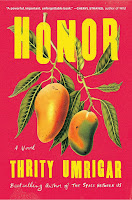Book Review: Honor by Thrity Umrigar
 |
My Rating:
3.5⭐️
"Abru.
It means Honor.”
Meena Mustafa’s husband Abdul was burnt alive by her brothers in an attack that left a side of her face disfigured and left hand permanently damaged - an ‘honor killing’ as punishment meted out for the crime of marrying inter faith. Meena , a Hindu, fell in love with Abdul , a Muslim, leaving her home to be with him , an act that is viewed as dishonorable by her family and community. Four months of marriage ends in tragedy for Meena who was then pregnant with her daughter who she names Abru, Meena ,having survived because of the intervention of her brother-in-law who has since absconded fearing for his own life, goes against the wishes of mother-in-law and with the help of a lawyer ,who is fighting her case pro bono, reopens the case against her brothers and is now awaiting the verdict. Meena is aware of the deep seated corruption and potential danger she is up against but does not shy away from fighting her case in the honor of her husband’s memory and for the sake of her daughter so that she would grow up knowing that her mother did her best to fight for justice.
Indian American journalist Smita travels to India to continue the coverage of Meena’s story as a favor to a colleague ,Shannon, who is recuperating from surgery. Accompanied by Mohan, a friend of Shannon, who acts as translator and mediator and coordinating with Anjali , Meena’s lawyer, she travels to Meena’s marital home to meet her where she is a social pariah among her neighbors on account of fear and communal bias, She then travels to Meena’s native village to meet her brothers, who have been roaming freely after the charges were initially dropped, and the rich, powerful and unscrupulous village head who orchestrated the whole incident and is brazenly confident of the verdict being ruled in the their favor.
Smita is settled in the United States, but her family was once based in Mumbai with her having spent the first 14 years of her life there. While acknowledging that India is a country of rich culture and knowledge with an economy that is growing in leaps and bounds , in Meena she bears witness to the plight of less fortunate women in rural India stuck in a vicious cycle of poverty, lack of infrastructure and education and the influence of men acting as God in their own little kingdoms with little or no interference from local law enforcement . Having traveled the world on various assignments she has covered events associated with power struggles, poverty , religious intolerance and violence against women. But now she feels unable to deny her roots and it is this pull she feels that prevents her from treating this assignment and in turn Meena in the objective or dispassionate manner her profession demands. Her experience becomes a personal one which in turn forces her to recall the traumatic incidents that prompted her own family to migrate to the United States over twenty years ago . Smita (and the reader) is compelled to draw parallels. The stark contrast of their lives and the life altering impact of their respective ordeals are revealed through a powerful narrative that will keep you engaged till the every end.
In Honor, the author delves into a social issue headlining Indian and international news media- honor killings. The vivid descriptions from the Mumbai coastline to the bullet ridden walls of the Leopold Café (that bear witness to the terrorist attacks of November 26, 2008) and the street markets of Colaba to the rural countryside and rough terrain of Birwad and Vithalgaon are so beautifully penned that you feel like you are sharing Smita’s journey. But the romantic track was unnecessary (with its Indian movie style love story) and lessened impact of what could have been a more powerful novel.I have read several of Thrity Umrigar’s novels in the past and I feel Honor would deserve a place amongst her very best if it were not for the ending, with the author shifting focus onto Meena and Mohan's relationship.
However, it is a hard-hitting , evocative and compelling novel. The author has exhibited considerable restraint and respect while dealing with a sensitive topic. Not an easy read but when a story revolves around social evil, it is not meant to be. It is unfortunate when the very men who believe in upholding the honor, values and beliefs of a particular caste, creed or religion fail to comprehend that as human beings there is no honor in intolerance and discrimination, there is no honor in communal hatred and there is certainly no honor in violence fueled by that hatred. At the risk of sounding preachy, I will say that as one of many women who can confidently claim to have had it better , the question we can ask ourselves and act upon is what we can actually do for women who are not as fortunate.
“Smita herself had repeated the platitudes about the humanizing effects of literature and narrative journalism, how each medium cultivated empathy in readers. But toward what end?"
Comments
Post a Comment